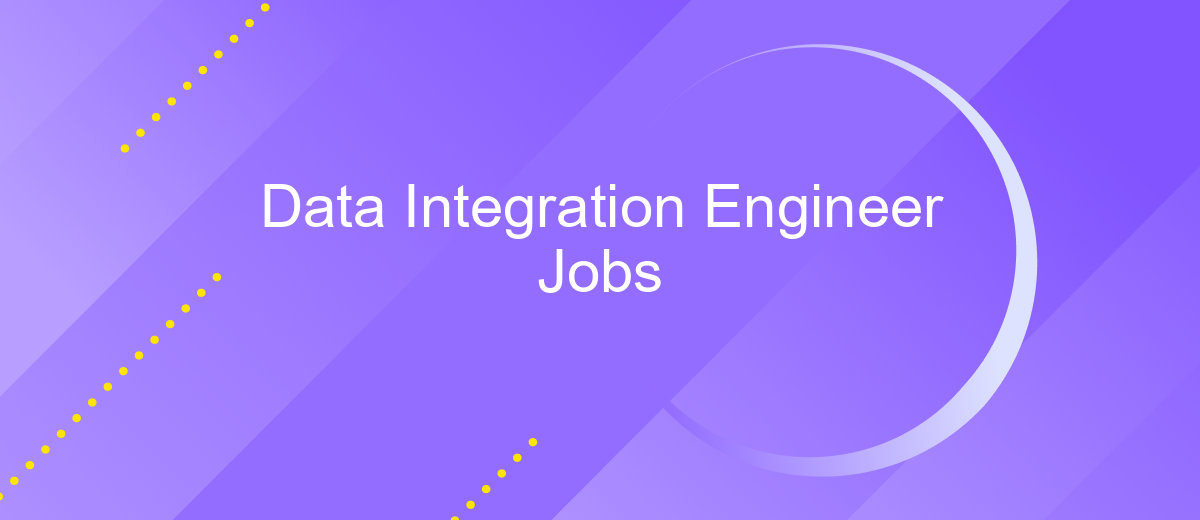Data Integration Engineer Jobs
Data Integration Engineer jobs are becoming increasingly vital in today's data-driven world. These professionals specialize in combining data from various sources, ensuring seamless data flow and accessibility. As businesses rely more on data for decision-making, the demand for skilled Data Integration Engineers continues to grow, offering exciting career opportunities for those with the right expertise and technical skills.
Introduction
Data Integration Engineers play a crucial role in modern businesses by ensuring seamless data flow between various systems and applications. They are responsible for designing, implementing, and managing data integration solutions that help organizations make informed decisions and improve operational efficiency. These professionals are skilled in various data integration tools and technologies, making them essential assets in today's data-driven world.
- Designing and developing data integration processes
- Ensuring data accuracy and consistency
- Collaborating with different departments to understand data needs
- Monitoring and troubleshooting data integration issues
- Utilizing tools like ApiX-Drive for efficient data integration
One of the key tools that Data Integration Engineers often use is ApiX-Drive. This service simplifies the process of setting up integrations between various applications and systems, allowing engineers to focus on more complex tasks. By leveraging such tools, Data Integration Engineers can ensure that data flows smoothly and accurately across the organization, enabling better decision-making and enhanced business performance.
Job Description

The Data Integration Engineer is responsible for designing, developing, and maintaining data integration solutions that enable seamless data flow between various systems. This role involves working closely with cross-functional teams to understand data requirements, ensuring data quality, and implementing best practices for data integration. The engineer will utilize tools such as ETL processes, APIs, and data pipelines to integrate data from multiple sources into a unified system, ensuring accuracy and consistency.
Additionally, the Data Integration Engineer will employ services like ApiX-Drive to automate and streamline the integration process, reducing manual effort and increasing efficiency. The role also includes monitoring and troubleshooting data integration issues, optimizing performance, and documenting integration workflows. Strong analytical skills, attention to detail, and the ability to work in a fast-paced environment are essential for success in this position. The ideal candidate will have experience with database management, programming languages, and data integration tools.
Required Skills

As a Data Integration Engineer, you will need a diverse set of skills to effectively manage and streamline data from various sources. Strong technical expertise, analytical thinking, and problem-solving abilities are essential to succeed in this role.
- Programming Languages: Proficiency in languages such as Python, SQL, and JavaScript is crucial for writing scripts and managing data workflows.
- Data Integration Tools: Familiarity with tools like ApiX-Drive, which facilitate seamless integration between different platforms, is highly beneficial.
- Database Management: Experience with relational databases (e.g., MySQL, PostgreSQL) and NoSQL databases (e.g., MongoDB) is necessary for data storage and retrieval.
- APIs and Web Services: Understanding of RESTful APIs and SOAP, as well as experience in integrating third-party services, is essential.
- ETL Processes: Expertise in Extract, Transform, Load (ETL) processes and tools like Apache NiFi or Talend is required for efficient data management.
- Data Warehousing: Knowledge of data warehousing solutions such as Amazon Redshift or Google BigQuery is important for large-scale data storage.
In addition to technical skills, excellent communication and teamwork abilities are vital for collaborating with other departments and stakeholders. Continuous learning and staying updated with the latest industry trends will also help you excel in this dynamic field.
Education and Experience

A successful Data Integration Engineer typically holds a bachelor's degree in computer science, information technology, or a related field. Advanced degrees or certifications in data management, data science, or systems engineering can be advantageous and may set candidates apart in a competitive job market. Practical experience in data integration, data warehousing, and ETL (Extract, Transform, Load) processes is essential for this role.
Hands-on experience with integration tools and platforms, such as ApiX-Drive, is highly beneficial. These tools streamline the process of linking various data sources and systems, ensuring seamless data flow and accuracy. Familiarity with programming languages like SQL, Python, and Java, as well as knowledge of database management systems, is often required.
- Bachelor's degree in Computer Science, IT, or related field
- Experience with data integration and ETL processes
- Proficiency with integration tools like ApiX-Drive
- Knowledge of SQL, Python, Java, and database management systems
- Advanced degrees or certifications in data-related fields (preferred)
Employers also look for candidates with strong problem-solving skills, attention to detail, and the ability to manage multiple projects simultaneously. Effective communication skills are essential, as Data Integration Engineers often collaborate with various teams and stakeholders to ensure data integrity and integration success.


Salary and Benefits
Data Integration Engineers can expect competitive salaries that reflect their specialized skills and experience. Entry-level positions typically offer annual salaries ranging from ,000 to ,000, while more experienced engineers can earn upwards of 0,000 or more. Compensation packages often include performance bonuses, stock options, and opportunities for career advancement within the company. Additionally, many employers provide comprehensive health benefits, retirement plans, and generous paid time off to attract and retain top talent in this field.
Beyond financial compensation, Data Integration Engineers often enjoy a range of professional benefits. Many companies offer flexible working hours and remote work options, allowing engineers to maintain a healthy work-life balance. Access to cutting-edge tools and platforms, such as ApiX-Drive, enables engineers to streamline integration processes and enhance their productivity. Continuous learning opportunities, including workshops, certifications, and conferences, are frequently provided to help engineers stay current with the latest industry trends and technologies.
FAQ
What does a Data Integration Engineer do?
What skills are essential for a Data Integration Engineer?
How does ApiX-Drive help in data integration tasks?
What industries typically hire Data Integration Engineers?
What is the career progression for a Data Integration Engineer?
Time is the most valuable resource for business today. Almost half of it is wasted on routine tasks. Your employees are constantly forced to perform monotonous tasks that are difficult to classify as important and specialized. You can leave everything as it is by hiring additional employees, or you can automate most of the business processes using the ApiX-Drive online connector to get rid of unnecessary time and money expenses once and for all. The choice is yours!

